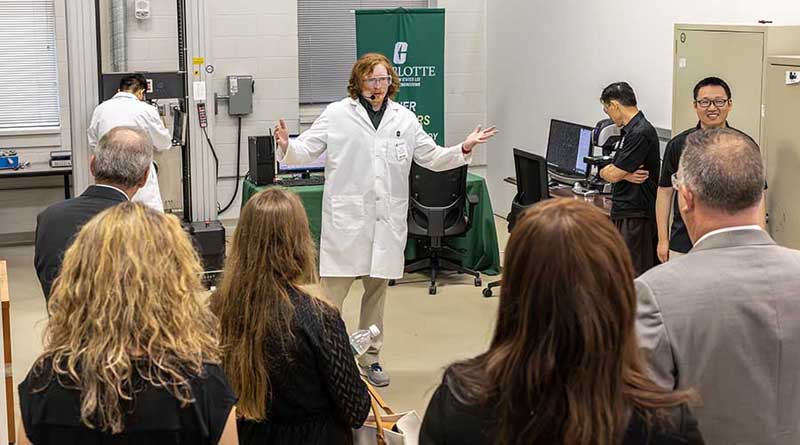Charlotte Expands Its Research Capacity
The “Engineering North Carolina’s Future” initiative, backed by transformative investments by the N.C. General Assembly, has ignited a surge of teaching and research excellence in engineering, computer science and data science at UNC Charlotte. The University has strategically expanded its teaching and research capabilities with an initial recruitment of eight new faculty members, focused on four core themes: energy systems, transportation and advanced mobility, advanced manufacturing, and smart and sustainable cities.
This influx of world-class researchers and educators in recent months represents the first phase of UNC Charlotte’s plan to recruit roughly 20 new faculty members thanks to the state’s investment. In addition, the University will use funds to renovate and equip leading-edge research facilities as part of its plan to grow STEM-focused enrollment by approximately 2,000 undergraduate and graduate students over the next several years.
This strategy showcases UNC Charlotte’s commitment to transformational collaboration across disciplines, as the cluster hire approach of simultaneously recruiting multiple scholars from various fields who share overlapping interests is a proven technique used by top universities to quickly and effectively amplify their research and teaching impact.
UNC Charlotte’s College of Computing and Informatics graduates more computer science students than any university in North Carolina and ranks No. 7 in the nation for the number of computer science graduates produced annually, with a combined enrollment of nearly 4,800 undergraduate and graduate students. The University’s William States Lee College of Engineering has an average enrollment of over 3,500 students across all its programs and awards roughly 800 degrees each year, contributing to its alumni base of over 16,000 Niners across the globe.
“As a driving force for economic development for the region and state, UNC Charlotte is committed to expanding our research enterprise in computer science, engineering and data science through interdisciplinary inquiry, research and creative discovery,” said Jennifer Troyer, provost and vice chancellor for academic affairs. “We are excited to welcome these new faculty to the University and know their work will be critically important to achieving the interdisciplinary goals of the Engineering North Carolina’s Future initiative.”
The recent cluster hire has brought three faculty members to the William States Lee College of Engineering (Assistant Professors Shawn Chen and Mahmoud Dinar and Associate Professor Qiang Zhu in mechanical engineering) and five to the College of Computing and Informatics (Professor Marco Viera and Assistant Professors Hongfei Xue and Li Yang in computer science, and Assistant Professors Tao Wang and Jian Xiang in software and information systems).

